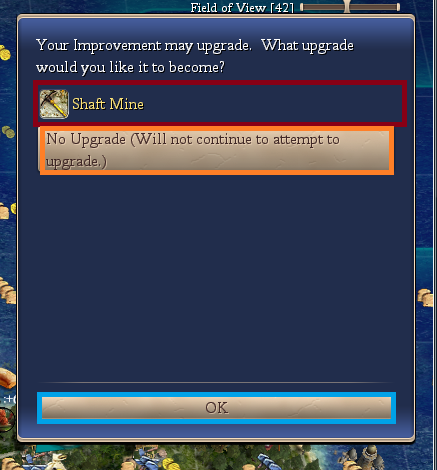Hmm... I haven't been having money problems... been finding the balance about right but only a little weighted towards easy perhaps. Civic choices have a LOT to do with that of course, as does capturing religious capitals and their shrines etc...
I'd say the major factor is the number of cities you have (along with the civics that change the maintenance cost of cities). It's easy to run a big surplus or a big deficit depending on how many cities you build; if you have lot of space to expand, it's really up to your playstyle. Maybe happiness could play a bigger role in limiting how many cities you may build.
Also, as most bonus from buildings, trade routes, etc. are usually

or

instead of

, the slider do not have as much importance as it could. But that's probably a debate for another topic

To get back on-topic:
IMHO I'd be inclined towards setting/increasing the cost of improvements. The reason is, right now, the only cost you have to improve terrain is the (low) initial cost of the worker. After that, it's just a matter of letting it work - meaning that you can literally cover your territory with the latest improvements at no cost (except cottage, some roads and a few others). Building several workers early is a no-brainer given the "return on investment" they offer; for the rest of the game, it mostly just a matter of micromanaging them, there's no real "gameplay" cost preventing you to improve everything everywhere.
The gatherer (and slave) gameplay is slightly different: you have a cost to build the improvement equal to the cost to build the gatherer. I find the gatherer's cost a bit high and it'd be painful later in the game to have to move each unit from a city to the tile to improve, but gameplay-wise, it's more interesting than workers.
That's why I think having a cost to build or improve improvements would be a good thing: not because it'd be a way to decrease an overflow of gold, but precisely because it'd force to consider whether an improvement is worth its cost, especially if money if tight. An interesting game is always about (difficult) choices

An alternative, faster to implement solution (probably easier for AI too) would be to have a maintenance cost for workers (a few

per turn), like city guards or healers. Not as "fun" as per-improvement cost IMHO, but would at least make the construction of packs of workers less of a no-brainer.
If increasing

cost here cause money issues, some buildings could see their cost lowered to balance things up for example. Again, it's not about making the player spend more money, but that available development opportunities should come at a cost to allow different strategies than "build everything I can".

 or
or  instead of
instead of  , the slider do not have as much importance as it could. But that's probably a debate for another topic
, the slider do not have as much importance as it could. But that's probably a debate for another topic 
 also as part of the trade routes output...
also as part of the trade routes output...
 if you don't have them.
if you don't have them.